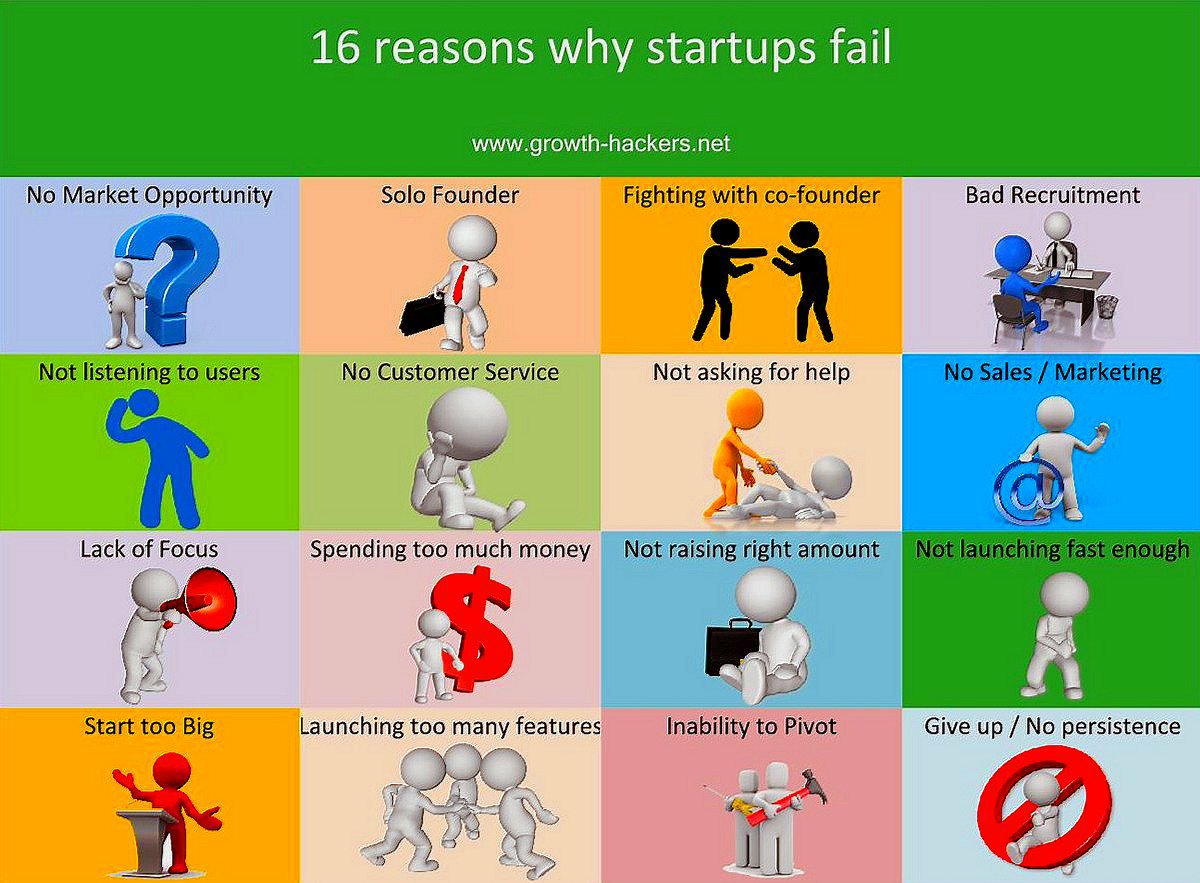Physical Address
304 North Cardinal St.
Dorchester Center, MA 02124
Physical Address
304 North Cardinal St.
Dorchester Center, MA 02124

The rate of “startup failure” is scary, to say the least. However, startups are at the heart of the American Dream. Talk about any Fortune500 company or tech giants like Facebook or Google—they had all been small startups at one time before evolving into what they are at present. So, startups are basically the crux of commercial prosperity. However, the success of these “once” startups cannot really wipe out the failure of the various other startups or small businesses in the country.
Now, there is a widely believed myth that most of the small businesses actually fail in their first year. The stats revealed by Inc.com, however, bring a very different reality to the fore. It has been revealed that it’s the long term outlook of these businesses that paves the way for fear. As per their report, 96% of the small businesses actually collapse in their first 10-year period itself. Notably, these stats are further supported by US Bureau of Labor Statistics.
There definitely is no dearth of reasons why startups fail. However, the question remains whether most of the startups fail in the first year or the first ten years or not. Knowing the most common reasons behind the failure of startups and rectifying the same can actually help you avoid the mistakes while heading a startup at the first place. Read on in order to unravel in the course of the post.
Thanks to the report by recent CB Insights, aspiring entrepreneurs can actually explore more than 101 startup failure stories. This particular report will actually tell you that the total sum of all the percentages far exceeds 100% – quite simply because most of these businesses falter because of more than one reasons. Documented below are just five of the reasons behind the failure of the small businesses.

According to CB Insights, pricing remains one of the main areas of concern. And where exactly do they fail? In determining the perfect price ensuring that it is not too high or too low as far as making money with respect to particular costs of the company is concerned. Caron Beesley in US Small Business Administration blog has offered ways in which small businesses can ensure that they are avoiding pricing mistakes at all costs.
According to him, it is very important for small businesses to evaluate service costs by analyzing overhead and total costs. It is important on the part of the businesses to have a thorough idea about what competitors are charging. Additionally acquaint yourself with tried, front-end and back-end pricing. Most of the successful or rather efficient accountants out there will suggest you consider prices of goods and services and the add-ons while you’re in the process of zeroing in on price tags. You think that you cannot charge enough because you’re a small business – that often becomes the reason behind your undoing. Comprehend conversions better in a bid to aim for right pricing.

It all happens so often. You think that you are the only business that has come up with a certain idea only to find out that there several others “churning out” similar products or services – just with a different name (but of course)! Though sad, it’s unfortunately true that while some of the dominant organizations end up floating in the long run, the one which originally came up with the idea actually phases out. You are not really asked to be obsessed with your competition but make sure you are not ignoring them either – because if you are doing that you are actually undermining their abilities to topple you. This is the reason behind the failure of 19% of startups as have been reported.

This remains one of the most difficult tasks faced by companies. Do you know even the most successful names in the industry like Uber are still figuring out ways in which they can actually go on to design a cohesive team? Travis Kalanick resigned as CEO amidst rumors that the company has conspicuously failed to preserve conducive ambiance for women. This instance should be lesson enough for you to acknowledge the fact that no matter how famous a startup is, it’s not immune to problems that can herald its possible decline. Working with a small freelancing team can help businesses if they are unable to launch products with a huge in-house team.

Around 25% of startups are actually found to collapse because of issues in cash flow. And, let us tell you that cash flow problems can actually stem from managing the money that has already been earned or for that matter from earning the money in the first place. Heather Jenning, the financial writer thus suggests that creating an accurate cash flow forecast is crucial to the success or for that matter the preservation of the business. Here are a few simple steps involved as far as creating a forecast is concerned:
It has been pointed out that most of the startups out there do not run out of cash because they do not already have earned enough cash but primarily because they end up acting in fiscally irresponsible ways like spending on foolish stuff etc.

That is where they falter – mostly. It has been found that most of the small businesses out there are way too involved in solving problems that excite them rather than what can be associated with the present market needs. For instance, it was found in a report that a company providing office efficiency solutions to doctors found themselves at a loss when their appeal among customers declined quite simply because of the fact that doctors want more patients. A thoroughly decked up office or chamber would be of no use without patients coming in!